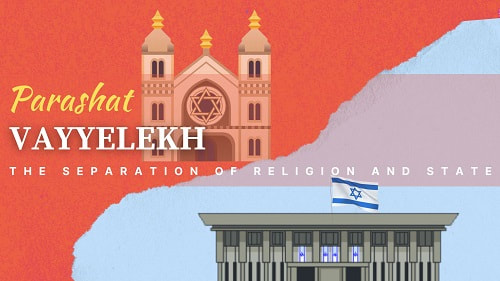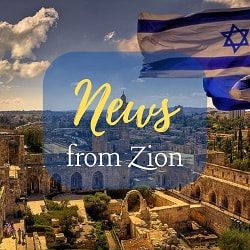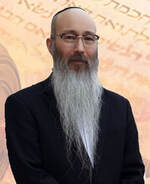|
By: HaRav Menashe Sasson Reporting from Jerusalem, Israel Published in the U.S.A. The concept of “separation of religion [church] and state” is a product of Western culture and is primarily of American origin. The concept, generally stated, holds that government and religion should be completely separated; that government should be secular and not involve itself in matters of religion, and that religion should not involve itself in matters of government. Although this concept is prominent throughout American legal jurisprudence and popular culture, the words “separation of religion [church] and state,” or their equivalent, are not contained in any of the founding documents of the United States. The constitutional provision which comes closest to the subject is the 1st Amendment, which states, “Congress shall make no law respecting an establishment of religion, or prohibiting the free exercise thereof. . . .” U.S. Const., amend I. After setting forth the constitutional protections for religion, the 1st Amendment continues by setting forth a general constitutional protection for speech: “or abridging the freedom of speech, or of the press; or the right of the people peaceably to assemble, and to petition the government for a redress of grievances.” Id. Based on the structure of the 1st Amendment, the drafters of the U.S. constitution presumably perceived a connection between religious worship and free speech. Prior to ratifying its constitution, the United States, in a formal written document, declared its independence from Great Britain. The Declaration of Independence (“Declaration”) contains numerous references to G-d. For example, the Declaration refers to the “Laws of Nature and of Nature's God,” “all men are . . . endowed by their Creator with certain unalienable Rights,” and “with a firm reliance on the protection of divine Providence, we mutually pledge. . . .” Declaration of Independence (US 1776). Furthermore, John Adams, one of America’s Founding Fathers, and the first vice president and second President of the United States, wrote that the U.S. “Constitution was made only, for a moral and religious people. It is wholly inadequate to the government of any other.” John Adams, letter to the Massachusetts Militia (Oct. 11, 1798). The “moral and religious people” to whom Adams was referring were the Christians, of various denominations, who founded America on biblical principles derived from the Torah. In an inconsistent and illogical application of a rule relating to the interpretation of legal texts, American courts have held that, when interpreting a provision in the Constitution, it is inappropriate to refer to the Declaration as a means of ascertaining the intent of the Founders who wrote the U.S. constitution, but it is somehow perfectly acceptable to refer to legislative history when attempting to ascertain the intent of lawmakers who wrote a particular statute. Israel’s 1948 “declaration of independence” provides that Medinat Yisra’el (the State of Israel) shall be a “Jewish state” and that establishing a Jewish state is a “natural right of the Jewish people to be masters of their own fate, like all other nations, in their own sovereign State.” Declaration of Establishment of State of Israel (1948). The Israeli Knessett (legislature), in 2018, passed a “Basic Law” reaffirming that Medinat Yisra’el is a “Jewish state.” In ruling on a challenge to the law, the Israel Supreme Court, without engaging in any meaningful legal analysis, said that the law merely declares the obvious – that Israel is a Jewish state. However, Israel’s 1948 declaration also states that Medinat Yisra’el would be a democracy, that is, it “will ensure complete equality of social and political rights to all its inhabitants irrespective of religion. . . .” Id. Both the United States and Israel have adopted positions on religion and state which are internally inconsistent. The U.S., although not formally adopting a religion, declared its independence from Great Britain and ratified a constitution based on freedom and principals founded in democracy, but while also acknowledging, at least implicitly, that such a system of government could succeed if, and only if, its citizens were a “moral and religious people” who are guided by Torah principles. The U.S., through both legislative policy choices and separately, through its judiciary, has rejected the “moral and religious” values which John Adams recognized as necessary for the success of a free society and has replaced those moral and religious values with a separation between religion and state. The results are not hard to see: a significant and ever-increasing decline in the prevalence of the “traditional,” Biblically-based family, which in turn is responsible for ever-increasing rampant crime and civil unrest, abortion-on-demand, homosexual “marriage,” and a litany of other societal ills. Medinat Yisra’el has a somewhat opposite problem. Israel, although founded by socialists (e.g., atheists), declares itself to be a “Jewish state.” The defining attribute of “Jewishness,” of course, is the Torah. The Torah (the Jewish “constitution”), along with Halakha (Jewish statutory law) defines who is Jewish and prescribes rules for every conceivable aspect of national and individual life and conduct. Therefore, it is not possible for a country to be more than “Jewish state in name only” if it does not govern itself in accordance with Torah and Halakha, a point which was – and still is – lost on the vast majority of Medinat Yisra’el’s political “leaders.” Compounding the problem, Medinat Yisra’el’s schizophrenic attempt to “ensure complete equality of . . . political rights to all its inhabitants irrespective of religion. . . .” (e.g., Arab “citizens” of Israel) creates the irreconcilable situation where Israeli-Arabs, through a combination of a high birth rate and voting, could become the majority, instead of the minority, in Medinat Yisra’el and then use the democratic process to change Medinat Yisra’el from a Jewish state in name only to an Arab state. To prevent this all but inevitable outcome, Medinat Yisra’el could continue its current efforts to maintain a Jewish majority, efforts such as: declining to exercise sovereignty over the liberated lands (e.g., Judea and Samaria) and pandering to Israeli-Arabs through various government programs such as education, housing, and subsistence grants, all paid for, of course, with taxes collected from Jewish-Israelis. Just as the United States is disintegrating due to an abandonment of Torah values, so too, Medinat Yisra’el is placing its continued existence in serious jeopardy by failing to govern itself according to Torah, as HaShem intended. In Parasha Vayyelekh, we read of the Jewish people’s obligation to assemble the Beit HaMikdash (the Temple in Yerushalayim) once every seven years, on Hol HaMoed (the intermediate days of) Sukkot, following the Sabbatical year, and listen to the King read publicly from Sefer Debarim. The pesukim to be read start at the beginning of Sefer Debarim continue through the end of Shema (6:9), the second paragraph of Shema (11:13-21), and pesukim 14:22-28:69, all of which relate to allegiance to HaShem, the covenant between HaShem and the Jewish people, and reward and punishment. The purpose of this obligation, of course, is to reinforce the idea that Torah is the defining attribute of a Jew – and of the Jewish state. May we all merit to see through the fog which often obscures reality and, through Aliyah and subsequent involvement in the Israeli political process, help to make Medinat Yisra’el the Jewish state that it professes to be, but currently is not, as well as the Jewish state which HaShem desires. שבת שלום Shabbat Shalom! Copyright © The Israel Foundation. All Rights Reserved.
0 Comments
Your comment will be posted after it is approved.
Leave a Reply. |
THE ISRAEL FOUNDATION





